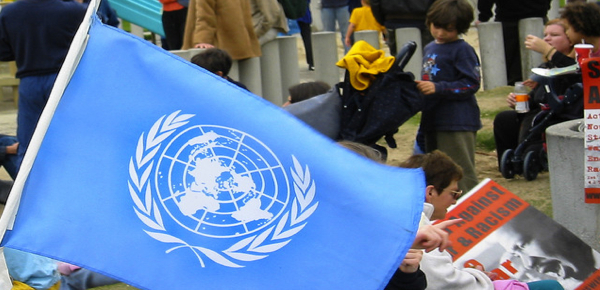Needs of communities near mines in poor countries must prevail in the mining lifecycle, says Global Policy Forum
The importance of going beyond environmental considerations when planning the lifecycle of mines to include socioeconomic considerations was among the topics raised at the Intergovernmental Forum on Mining, Minerals, Metals and Sustainable Development (IGF) at its annual general meeting, hosted by UNCTAD at the Palais des Nations, Geneva, on 27-29 October 2015.
While mining continues to play a key role in economic growth of several resource-rich developing countries, in several cases this has generated only very limited benefits in terms of sustainable development and reducing poverty. In some of these countries, mining activities also have adverse social and environmental consequences for the communities living next to extraction sites, and sometimes even at the national level.
IGF chair Glenn Gemerts of Suriname said that the multi-sectoral IGF meeting tackled a range of important issues, including mine closure practices and challenges; and the social impacts of mine closure; and has also overseen the emergence of a growing number of guidelines, standards, and certification schemes to guide the closure process.
"The vast majority of speakers, regardless of whether they represented government, civil society, academia or the private sector, agreed on the need to begin mine-closure planning as soon as processes for planning the mine commence," Mr. Gemerts said. "There was an extraordinary level of consistency between all stakeholder groups in this regard."
The Head of the Special Unit on Commodities, Samuel Gayi, made UNCTAD's opening and closing statements. He said many of the issues discussed at the IGF were "taboo" a decade ago, dividing opinions between developed countries and transnational mining corporations on one side with host countries, usually developing countries, and non-governmental organisations on the other.
Such issues included the need to leave communities near mines with a better quality of life at the end of a project than at the start; the development of ancillary industries and activities surrounding mining; the need for an effective and honest dialogue between companies and communities; and the need to work with communities to ensure that their social fabric and livelihoods are not negatively unnecessarily affected.
"The fact that we can debate these today in a congenial environment [the IGF] attests to the significant progress that has been made in bringing all parties to the table to have a good understanding of these, sometimes, complex issues; and which policy instruments best address them," Mr. Gayi said.
Integrating sustainable development into mining activities remains a major challenge, the IGF communiqu?(C) states. It says that given the mining industry's significant role in local livelihoods, national economies and the global market, the better alignment of its practices and policies with the Sustainable Development Goals (SDGs) will be a key part of successfully achieving the development agenda between now and 2030.
A joint draft report by the World Economic Forum , the United Nations Development Programme (UNDP), UN Sustainable Development Solutions Network (SDSN), and the Columbia Center on Sustainable Investment (CCSI) concluded that mining impacts all 17 SDGs, and presents both challenges and opportunities in achieving them. The report is expected to be adopted at the 2016 Davos Forum.
The IGF is the institutional framework for the Global Dialogue on Mining/Metals and Sustainable Development which was one of a number of Partnership Initiatives launched at the World Summit on Sustainable Development in Johannesburg, South Africa, 2002. All its meetings, including two preparatory meetings of the Global Dialogue in 2003 and 2004, and the IGF inaugural meeting in 2005 have since been held in Geneva in collaboration with UNCTAD.
The 54-member IGF is unique global venue for discussions on practical issues related to the sustainable management and development of the mining sector and brings together a growing network of leaders seeking to enhance the contribution of the mining sector to sustainable development. The objective of the IGF is to enhance capacity for governance in the mining sector at all stages of the life cycle. One of the IGF's major achievements to date has been the Mining Policy Framework (MPF), a document bringing together best practices to promote good governance in the mining sector. The MPF is implemented by the IGF.

